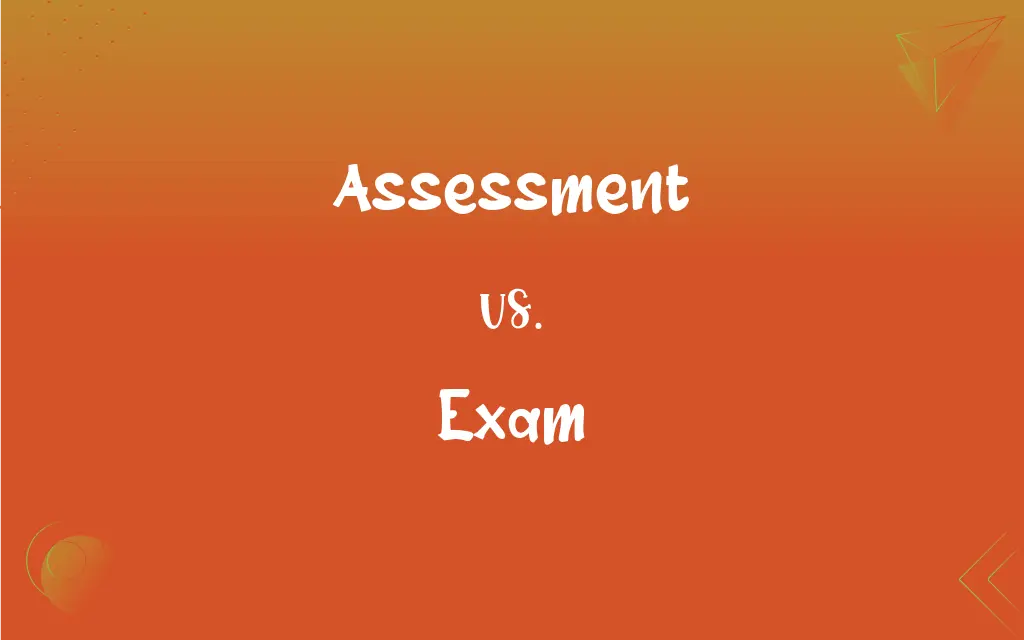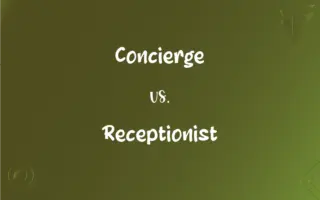Assessment vs. Exam: What's the Difference?
Edited by Aimie Carlson || By Harlon Moss || Updated on November 8, 2023
An assessment is a broad evaluation of abilities or knowledge, while an exam is a formal test focusing on specific information or skills.

Key Differences
An assessment is a comprehensive term that refers to various methods used to evaluate skills, knowledge, or performance. An exam, or examination, is a more formal method of assessment that typically involves answering a set of questions within a limited time frame.
Assessments can take many forms, including quizzes, interviews, observations, and reviews of work, and they may be formal or informal. Exams are usually formal, structured tests that are often scored and used to determine proficiency in a subject area.
The purpose of an assessment is to gather information that can lead to informed decisions in education, employment, and other areas. Exams specifically aim to measure what students have learned in a course or to certify their knowledge in a particular field.
While assessments might be used to guide learning and provide feedback, exams often serve as a benchmark for qualification or certification and are a common requirement in educational and professional settings.
In education, ongoing assessments may include homework, participation, and projects, providing a comprehensive picture of a student's understanding over time. An exam, such as a final or standardized test, is typically a one-time event that evaluates a student's cumulative knowledge up to that point.
ADVERTISEMENT
Comparison Chart
Definition
A method to evaluate knowledge or performance.
A formal test of knowledge or skills.
Format
Can be oral, written, practical, or observational.
Usually a written or oral test with set questions.
Purpose
To guide learning, provide feedback, or rate proficiency.
To measure learning outcomes or for certification.
Frequency
Can be continuous or at specific intervals.
Typically occurs at the end of a learning period.
Formality
Can be formal or informal.
Usually formal with established procedures.
ADVERTISEMENT
Assessment and Exam Definitions
Assessment
The act of making a judgment or forming an opinion.
After careful assessment, the committee approved the proposal.
Exam
A medical test to determine the state of a person's health.
The doctor conducted a thorough exam of the patient.
Assessment
An appraisal of property or income for tax purposes.
The property tax was based on the latest assessment of home values.
Exam
A formal test of a person's knowledge or proficiency in a subject.
She studied all night for her math exam.
Assessment
Evaluation or estimation of the nature, ability, or quality of something.
The teacher's assessment of her students' work was thorough.
Exam
An examination, especially one taken by students.
The final exams were scheduled for the last week of the semester.
Assessment
The process of testing or observing something to make a decision.
The assessment for the job position included several interviews.
Exam
An official interrogation or investigation.
The police held an exam of the witness's statement.
Assessment
A consideration of someone or something's value or importance.
His assessment of the situation was crucial to our decision.
Exam
A set of questions or exercises for evaluating skills or knowledge.
The certification exam included both multiple-choice and essay questions.
Assessment
The act of assessing; appraisal.
Exam
An examination; a test.
Assessment
An amount assessed, as for taxation.
Exam
(informal) examination, especially when meaning test or in compound terms.
Assessment
The act of assessing or an amount (of tax, levy or duty etc) assessed.
Exam
(sciences) Shortened form
Exam
A set of questions or exercises evaluating skill or knowledge;
When the test was stolen the professor had to make a new set of questions
FAQs
Do assessments contribute to final grades?
They can, depending on the educational institution's policies.
Can assessments be informal?
Yes, assessments can be both informal and formal.
Are exams only written?
Primarily, but they can also be oral or practical.
Is peer review considered an assessment?
Yes, peer review is a type of assessment.
Are all exams assessments?
Yes, all exams are forms of assessment.
Is an assessment always a test?
No, assessments can be tests but also include other forms of evaluation.
Do exams have to be supervised?
Most formal exams are supervised to ensure integrity.
Are self-assessments reliable?
They can be, provided they are done honestly and reflectively.
Can exams be part of an assessment strategy?
Yes, exams can be used within broader assessment strategies.
Are open-book tests considered exams?
Yes, open-book tests are a type of exam.
Are practical skills tested in exams?
Yes, practical exams test the application of skills.
Are standardized tests exams or assessments?
They are a specific type of exam used for assessment.
Can an exam be a diagnostic tool?
Yes, exams can diagnose strengths and weaknesses in knowledge.
Can assessments be qualitative?
Yes, assessments can be qualitative, quantitative, or a mix of both.
Can assessments include observations?
Yes, assessments can include the observation of tasks or behaviors.
Are assessments only academic?
No, assessments are used in various fields, including work performance.
Do exams always occur at the end of a course?
They often do, but not exclusively; there can be mid-term exams as well.
Do all exams result in a pass or fail?
Not always, some exams are scored on a scale or percentage.
Can an assessment be a portfolio?
Yes, portfolios are used as assessments in some fields.
Is homework considered an assessment?
Homework can be used as a form of continuous assessment.
About Author
Written by
Harlon MossHarlon is a seasoned quality moderator and accomplished content writer for Difference Wiki. An alumnus of the prestigious University of California, he earned his degree in Computer Science. Leveraging his academic background, Harlon brings a meticulous and informed perspective to his work, ensuring content accuracy and excellence.
Edited by
Aimie CarlsonAimie Carlson, holding a master's degree in English literature, is a fervent English language enthusiast. She lends her writing talents to Difference Wiki, a prominent website that specializes in comparisons, offering readers insightful analyses that both captivate and inform.
































































